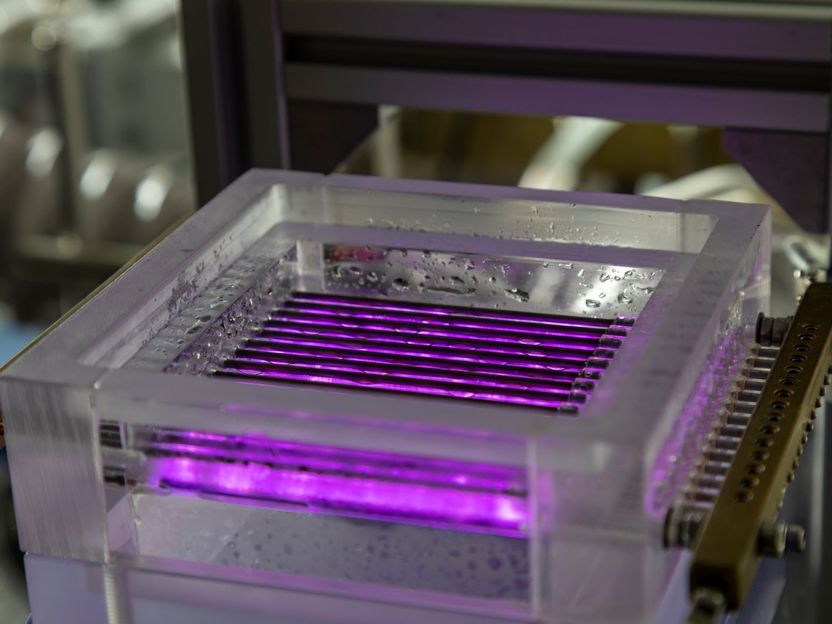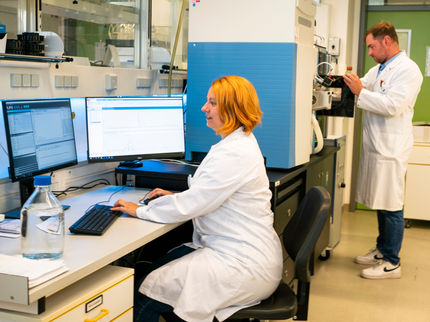Innovative technologies remove pharmaceutical residues from wastewater
Every year on 22 March, World water Day reminds us of the importance of one of the most important resources of life. Almost two-thirds of our planet is covered with water, but not even three percent is drinkable freshwater. Every day, large quantities of chemicals enter our waters and endanger the health of humans, animals and plants. In addition to pesticides, for example, drug residues also pollute our drinking water. The Leibniz Institute for plasma Science and Technology (INP) has developed technical solutions to clean wastewater of such pollutants.

Plasma in water spray: A contaminated water sample is nebulised via a nozzle and sprayed into a dielectric barrier discharge, which is ignited between two layers of metal and ceramic rods.
INP
According to information from the German Federal Environment Agency, more than 400 different active pharmaceutical ingredients, their intermediates or transformation products have already been detected in the environment. Veterinary medicinal products end up as fertiliser on our fields via liquid manure and dung or are excreted by grazing animals. From there, they enter water bodies and groundwater near the surface. Human pharmaceuticals reach sewage treatment plants via wastewater, but are usually not removed there.
The German Association of Research-Based Pharmaceutical Companies vfa points to the low concentration of pharmaceutical residues found in water. However, according to the association, one way to remove these residues would be to expand the sewage treatment technology currently in use so that pharmaceuticals do not end up in water bodies.
Innovative processes ensure clean water
Prof. Dr. Juergen Kolb, an expert in environmental technologies at the Leibniz Institute for Plasma Science and Technology (INP), explains the current state of research: "We combine classical physical processes for wastewater purification with new technologies such as ultrasound, pulsed electric fields and plasma technology. This allows us to break down chemical compounds such as drug residues but also other man-made contaminants and convert them into harmless substances."
These methods have already proven their potential in various INP research projects. Currently, the approaches are being transferred to practice-relevant environments. "Our approach is currently mobile plants that can be used in hospitals, for example, where water contamination with pharmaceutical residues is particularly high. Particularly in view of the increasing number of antibiotic-resistant microorganisms, we see an acute need for action here," Kolb adds. The technologies are also suitable for municipal sewage treatment plants as a fourth purification stage.
World Water Day was established by the United Nations. It has taken place every year on 22 March since 1993. This year's motto is "Accelerating Change". Worldwide, actions take place on this day to draw attention to the vital importance of water and to support initiatives for clean water and the careful use of the resource.
Organizations
Other news from the department science

Get the life science industry in your inbox
By submitting this form you agree that LUMITOS AG will send you the newsletter(s) selected above by email. Your data will not be passed on to third parties. Your data will be stored and processed in accordance with our data protection regulations. LUMITOS may contact you by email for the purpose of advertising or market and opinion surveys. You can revoke your consent at any time without giving reasons to LUMITOS AG, Ernst-Augustin-Str. 2, 12489 Berlin, Germany or by e-mail at revoke@lumitos.com with effect for the future. In addition, each email contains a link to unsubscribe from the corresponding newsletter.


















































